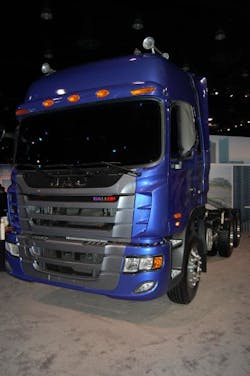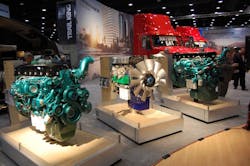I talked about Ustian’s ouster from Navistar yesterday with Sandeep Kar, global director of commercial vehicle research for Frost & Sullivan.
Ustian’s leave-taking didn’t surprise Kar much, as it followed the abrupt about-face Navistar made in recent weeks as it finally ditched its much-hyped advanced exhaust gas recirculation (EGR) system for addressing the 2010 truck exhaust emission reduction mandates established by the Environmental Protection Agency (EPA) in favor of the selective catalytic reduction (SCR) technology used by every other truck maker in the business.
Kar said it’s worthy to note that Navistar scored a lot of successes on Ustian’s watch: launching the ProStar and LoneStar tractors, new vocational and medium-duty truck platforms, and nearly doubling Navistar’s revenues from $7.7 billion to approximately $14 billion over the last decade or so – no mean feat, given the extreme economic ups and downs the world suffered during that period.
More importantly from Kar’s point of view, though, is the global focus Ustian helped establish for Navistar – through joint ventures in China, with Mahindra in India, and with MWM in South America. For it is outside the U.S. where the big growth in commercial vehicle demand is predicted to take place over the next 10 years; growth that will far exceed anything here in the U.S.
Indeed, it’s the ever-more global nature of the truck-making business today that is the driving force behind new designs, new technologies, compliance with an ever-expanding raft of government regulations, and of course how to do all of that and still make a profit.I sat down with John Coll, VP of global marketing for Eaton Corp.’s vehicle group, to discuss the impact of those trends – and just how monstrous they’ll be.
Take the global market for commercial vehicles – trucks and buses – for starters.
According to data from a variety of sources compiled by Eaton, commercial vehicle production doubled over the last 11 years, expected to reach 3 million units this year, up from just 1.5 million units in 2001.
By 2016, though, global production is expected to expand almost another 30% to 3.9 million units, said Coll – with 63% of that total demand coming from what he called “developing nations” such as China, India, Brazil, and others.
“The biggest take away from the data we see is this: in 2001, North America ranked number one or two in terms of the largest markets in the world for commercial vehicles. By 2016, though, North America will be tied for fourth,” Coll explained.
And it’s not just in terms of overall commercial vehicle production volumes either, he stressed, for demand for specific types of trucks – especially vocational models – will be huge from nations like Brazile, China and India.
Traditional logistics and road infrastructure doesn’t exist in those countries at the scale seen in the U.S., he told me – in Brazile for example 70% of the roads are unpaved – but that’s rapidly changing. Indeed, China has embarked on an effort to build some 80,000 kilometers (equivalent to 49,709 miles) worth of roads, with India expected to boost infrastructure spending from $500 billion to $1 trillion over the next 5 years, so the need for all manner of construction trucks abounds.
Coll noted that in North America vocational trucks as a group represent about 19% of overall production, whereas in China its 38% and 36% in India.
“This is why having a global truck strategy is so important for OEMs today,” Frost & Sullivan’s Kar told me. “Navistar had been one of the most aggressive companies in terms of its focus on global markets in recent years, but it’s something every OEM is doing – and must continue to do.”Indeed, it’s been the global focus of the European truck makers such as Daimler and Volvo that helped them develop SCR as an emission-control solution not just for Europe but the U.S. as well, while opening up more sales opportunities for their proprietary engines and transmissions.
Kar stressed that’s one of the advantages of maintaining a “global focus” in truck building: technology developed in one part of the world can be transferred to another, helping not only meet a regulatory requirement or improve efficiency for customers, but also potentially aid in lowering production costs for OEMs in the bargain.
“You focus on the global market in part to spread out production and research costs, bringing new design and technologies back to one’s home market,” Kar explained. “If the new long-term CEO Navistar selects maintains that global-strategy focus, it will be a good thing for the company.”






